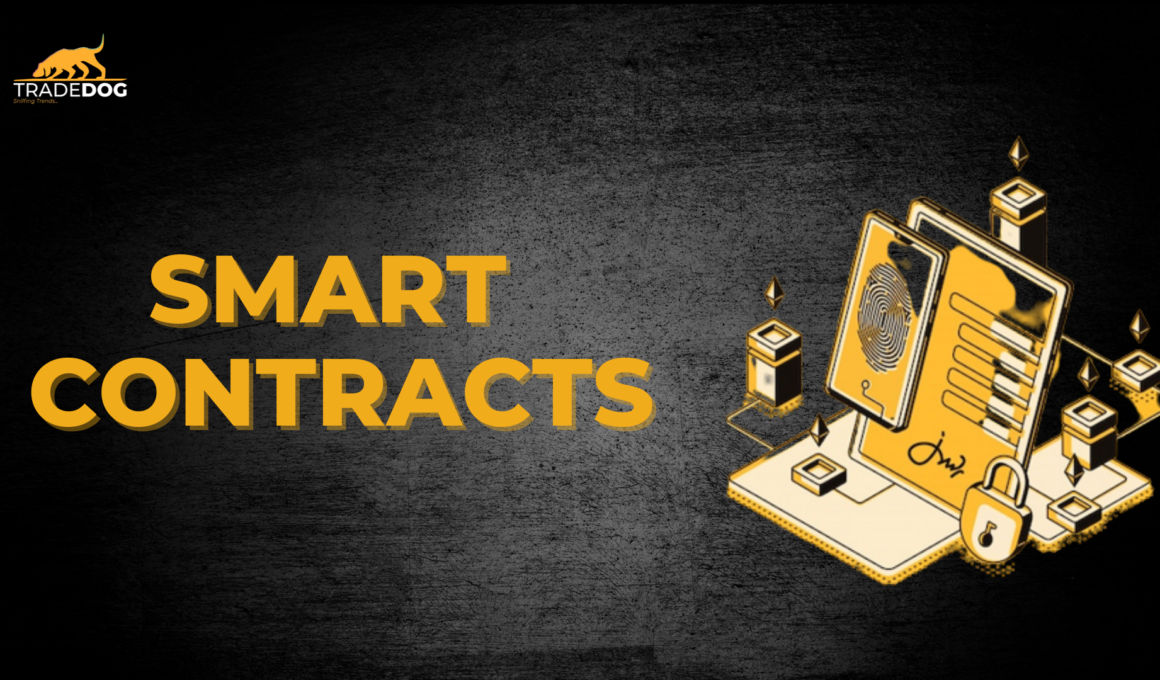Quick Links
The concept of smart contracts was first proposed by Nick Szabo in 1994. Like many other legal institutions, traditional contracts faced several challenges which can be resolved by digitization. The introduction of smart contracts paved the way for a new era of contracting and posed a challenge to the prevailing procedures of contract law.
What are smart contracts?
Smart contracts are basically autonomous programs used to automate the execution of an agreement so that all participants can be certain of the outcome without the need for an intermediary. Simply put, smart contracts are blockchain-based programs that execute when certain criteria are met.
Let’s take an example to understand it better

Suppose A(buyer) has to pay B(Non-trusted company) some amount for a service/product which has to go through a third party C (intermediary). In such a transaction, C will be getting paid by B as commission after B receives the money.
As B cannot be fully trusted, there can be a chance that the service/product does not reach A even after the payment or the money does not reach B .
This is where the role of smart contracts comes into play.
Smart contracts automate the whole process by using commands and ensure that the money reaches B while the product reaches A without the need of a third party i.e. C.

Thus, smart contracts digitize agreements by turning the terms of an agreement into computer code that automatically executes when the contract terms are met while eliminating the use of a third party
Why are smart contracts SMART?
Other than a normal contract, smart contracts basically are a set of codes, just like an “if/then“ statement, which gets executed upon fulfilment of predetermined conditions.
What it means is that as soon as the statement in the ‘if’ statement is satisfied, it triggers the command in the ‘then’ statement, hence automatically executing the contract.
As it is done automatically by the contracts which improve the processing speed of business processes and hence make it scalable to run across multiple enterprises
Benefits of Smart Contracts
Automation
As mentioned previously, there is no need for manual operation, rather smart contracts offer automatic execution when the contract conditions are fulfilled
Processing speed
Due to automation, the processing speed of transactions increases significantly
Cost efficiency
Smart contracts promise to automate business processes that span organizational boundaries. This can eliminate many operational expenses and save resources
Cost reduction
As middle-men are cut-out, the costs are significantly reduced as well.
Smart contract’s life cycle
The life cycle of smart contracts consists mainly of 4 steps i.e. create, freeze, execute and finalize.
Creation of Smart Contracts
- Just like a traditional contract, this phase focuses on the ideation of the contract where the parties decide on the agreement- the goals and objectives.
- This is followed by the conversion of these objectives into the length of codes.
- The code gets published on the distributed ledger (A distributed ledger is a database that is accessible across different sites by multiple participants).
- As soon as most of the nodes ( node is one of the computers that run the blockchain’s software to validate and store the complete history of transactions) confirm the block, the contract is available for execution.
Freeze
Next comes the freezing phase where any transaction to the wallets of smart contracts is frozen. Any sort of funds transfer is blocked during this period, this is done so that nodes can act as a governing body that verifies whether the preconditions for contract execution have been satisfied. This framework ensures that the blockchain only has legitimate contracts.
Execution
As the name implies, this phase involves the execution of the automation process of smart contracts. As the integrity of a smart contract is verified by the authenticating nodes, the new transaction data is then added to the blockchain and is once again verified by the nodes to ensure the agreed-upon terms in the contract.
Finalize
This denotes the final step of the life cycle where after the execution, the consensus mechanism (Consensus mechanisms are used to verify transactions and maintain the security of the underlying blockchain) verifies that the asset is received by the other party and hence unfreezes them indicating the completion of the life cycle.
Smart Contracts Real-life uses
Insurance company
The insurance companies can automate the insurance procedure by writing it into a smart contract. A formal contract that ensures coverage in accordance with the stated terms is an essential requirement for insurance companies. In addition, they must handle the claims resulting from various incidents and life events that result in the agreement’s activation.
Smart contracts are capable of carrying out the business process, including the formal agreement, issuance to the insured, and claim settlement in the event that the terms of the policy must be followed. Smart contracts can also be used to detect fraudulent claims
Example: A company called Etherisc is powered by smart contracts. Etherisc uses blockchain technology and hybrid smart contracts to make the purchase and sale of insurance more efficient, lowering their operational costs and bringing greater transparency to the insurance process.
Supply Chain Management
Like data management, supply chain management also suffers due to the traditional paper-based systems that many businesses still use. Smart contracts automate the supply chain hence increasing efficiency and transparency.
Example: A business can use smart-contract-powered supply chains and improve its inventory tracking. A company called De Beers uses smart contracts to monitor the diamond production process and track the transit of diamonds from the mine to retail outlets.
Trading
Trades can be automated without the need of intermediaries.
Example: Uniswap runs on two smart contracts; an “Exchange” contract and a “Factory” contract. These are automatic computer programs that are designed to perform specific functions when certain conditions are met. The exchange contract facilitates all token trades without the need for any intermediary.
Smart contract Challenges
High stake flaws
Flaws in smart contracts may result in costly errors and potentially the loss of users’ assets. There have been many recent examples of hackers exploiting errors in smart contract coding to drain users’ accounts.
A Blockchain startup MonoX Finance said that a hacker stole $31 million by exploiting a bug in software the service uses to draft smart contracts.
Confidentiality Issue
Users can interfere with the blockchain application to reveal the state of the contract. So, it would mean that the privacy and confidentialityof the user’s data are violated.
Security Issue
Security remains one of the main concerns regarding smart contract technology. A small error in the code of a smart contract can result in millions of dollars in loss. Therefore, when it comes to writing a smart contract, security should always be the developer’s top priority.
According to a report from the Guardian, more than $300 Mn of cryptocurrency was once lost after a series of bugs in a popular digital wallet service led one curious developer to accidentally take control of and then lock up the funds. This shows that a small error in a code can also create some major security issues.
Conclusion
It can be concluded that there is no doubt that smart contracts have been and will be a very effective way to manage processes as it greatly reduces cost and time, but this does not mean that it doesn’t come without limitations. The confidentiality and security issue still exists which are being resolved as the technology is getting more and more advanced.
Coming onto the application, smart contracts are being introduced in people’s daily lives that may include automated insurance claims, improving the efficiency of supply chain management, etc. which clearly indicates the use of blockchain technology and its potential for the future. With its advancement, it will be exciting to see the full prospects of these smart contracts as more and more companies adopt and implement them in their business operations.






New Multifunction Waterproof Backpack
The best ever SUPER Backpack: Drop-proof/Scratch-resistant/USB Charging/Large capacity storage
50% OFF for the next 24 Hours ONLY + FREE Worldwide Shipping for a LIMITED time
Buy now: https://thebackpack.biz
Regards,
France
Good Morning
I wanted to reach out and let you know about our new dog harness. It’s really easy to put on and take off – in just 2 seconds – and it’s personalized for each dog.
Plus, we offer a lifetime warranty so you can be sure your pet is always safe and stylish.
We’ve had a lot of success with it so far and I think your dog would love it.
Get yours today with 50% OFF: https://caredogbest.com
FREE Shipping – TODAY ONLY!
All the best,
Jeanna